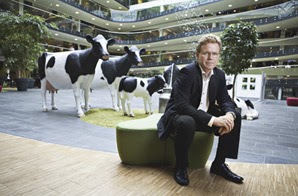Is the lesson from history that leaders succeed until they fail? You might think fixed-terms presidencies or other forced retirement options help to avoid eventual inevitable failure, allowing leaders such as Nelson Mandela to quit while they’re ahead. His laudable example is an exception; we often face leadership disappointment, even in the most promising people.
This article is provided by the Leadership Institute
Indeed, one might be tempted to wonder if we can just skip the problem altogether and go leaderless. We see this in families, sports clubs, music groups, and even in business. Several companies such as the makers of Gore-Tex have pioneered self-managing teams with fluid sharing of responsibility, and the minimal or episodic involvement of leaders.
Showing posts with label Arla Leadership Programme. Show all posts
Showing posts with label Arla Leadership Programme. Show all posts
Wednesday, 15 June 2016
Tuesday, 12 November 2013
ControllingTthe Value Chain – Arla foods
Peder Tuborgh, CEO of Arla foods provides proof that the co-operative model is alive and going global.
In the wake of the financial crisis and occasionally over-excitable examination of the nature of capitalism, co-operatives have been increasingly talked about. They are the alternative model, but one viewed by most as so alternative as not to be worth exploring.
For those who doubt the robustness and contemporary usefulness of co-ops in a global business world, a visit to the dairy farms of Denmark, Sweden, the UK and Germany might be fruitful. Here they would find that the co-operative cream really does rise to the top. The co-operative model is often used in the dairy industry.
In fact, 70 per cent of the major dairy companies in Europe are co-ops. More than 12,000 dairy farms in Europe are members of the Arla Foods co-operative. Arla is best known for its biggest brands — Lurpak, Arla and Castello. It is a large global business — investing in recent years in Russia, China, the Middle East and Africa — and has been run as a co-operative since its inception in Denmark in the late nineteenth century. It produced 10.4 billion kilograms of milk in 2012, has more than 18,000 employees and its 2012 turnover was some 63,114 billion Danish kroner (£7.2 billion).
Subscribe to:
Posts (Atom)
Note:
created by Solomon 2009, note videos on this site are not proprietary

